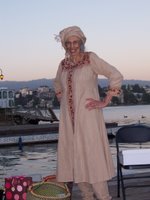Sister Makinya Kouate


Saturday, July 1, Sister Makinya celebrated her 80th birth year. As in years past the affair was held at the water's edge, her late parents present and honored with much ceremony witnessed by Sister Makinya's loved ones, friends, family and age-mates.
Sister Makinya shared stories about her life. She also told us about how she established the first Black Student Union in the country at Merritt College in Oakland, years before San Francisco State University's department, though Merritt College for some reason is always eclipsed in the narrative history even though Jimmy Garrett (SFSU), according to Sister Makinya, monitored closely how Merritt students were able to achieve this without violence, although San Francisco State University was not.
This renaissance woman is also responsible for the establishment of Kwanzaa as a seven day ritual ceremony for African people beginning in December 1967. She told me about how she and Fred T. went to Los Angeles to visit Ron Karenga, Ph.D., in December, 1966, where Karenga handed her two mimeographed sheets with the principles and few instructions about this new black holiday.
December, 1977, Karenga visited the Kwanzaa ritual here and was according to Sister Makinya, "Blown away by what they'd done with it."
Immediately following this, Dr. Karenga (founder of United Slaves or US, and Kwanzaa) began to commercialize Kwanzaa, and bring in white people, the first at a workshop in the Redwood School District, where teachers were charged $75. When panelist Sister Makinya asked one of the facilitators about the white presence, he responded that Kwanzaa as well as United Slaves was now universal.
At the same time, Karenga who hadn't published his Kwanzaa manual yet, according to Sister Makinya fictitiously republished his 1978 Kwanzaa book with a 1965 publishing date (I don't know how one can legally do this.) Karenga also added the extra "a" to the spelling of Kwanzaa to facilitate the copyright change.
Sister Makinya's book about Kwanzaa is entitled: "Classic Leadership Manual."
This week when I visited Sister Makinya at her home in Berkeley we spoke about Queen Califia, the queen whose name became the name of this state: California. I told her that from what I've read Queen Califia was a mythical character, from a novel written by a Spanish author (John Templeton). Fascinated with the story, Cortez set out from Spain searching for the island where the Amazon warrior queen lived, a place he found off the coast of Southern California. (The mural of her exploits is in the Room of the Donns at the Mark Hopkins Hotel in San Francisco, also in the Senate chambers at the CA State Capital.)
True, she could have existed and now we call her a myth. Similarly with the film about Kwanzaa due out in December, moderated by Maya Angelou, a film A.K. Asante says he wants to be a positive film about a positive African celebration, I wonder if Asante plans on calling Sister Makinya (I gave him her number in May.) I also wonder if he knows about the earlier PBS doc. about Kwanzaa.
I wonder about people with public amnesia when setting the record straight threatens the false sense of power these men employ. Sister Makinya could, like Queen Califia, recede to the mythical realm. She said Karenga tells people who ask, that he doesn't know a Sister Makinya.
Funny how this man named Maurice who learned how to perform Kwanzaa at the Postal Street Academy was honored as the person responsible for bringing Kwanzaa to San Francisco.
You can imagine his shock when at the Center for African American Art and Culture as he accepted the honors when his teacher, Sister Makinya stood up.
It's not even a question of invisibility, it's a question of integrity and what drives people to reinvent their lives based on falsehoods.
The sister who described herself as sassy Saturday, twirling around in her beautiful birthday dress, does not worry about the intellectual thieves because she knows what she has done. For all who are interested in the truth, all one needs to do is check the public record or talk to those who were there in 1966, 1967-1977, like Fred T., Leon Williams, and Avotcja.
This is certainly one area among many in the African community which needs a healing; both individuals: Sister Makinya and Dr. Karenga, have done great work for our community consistently for all the years between their last conversation with each other.
Photos are from the ritual gathering 7/1/2006 at Lake Merritt. Credit: Wanda Sabir

0 Comments:
Post a Comment
<< Home